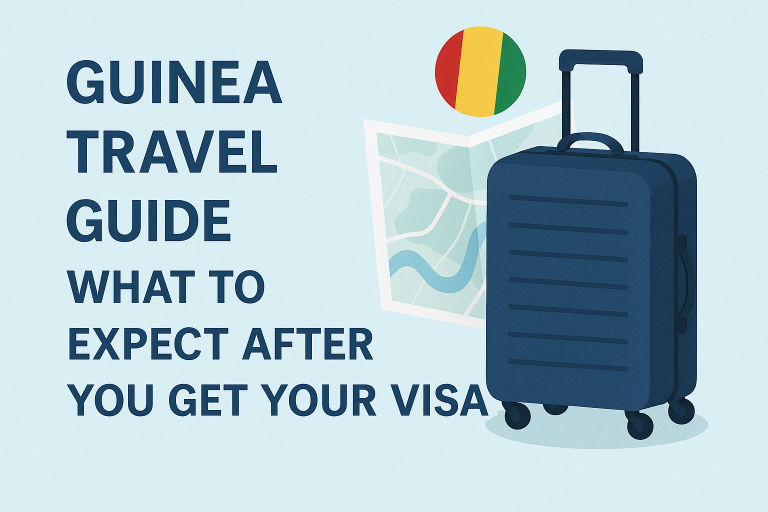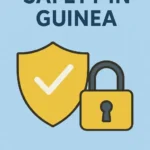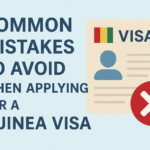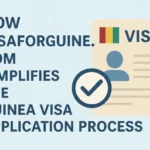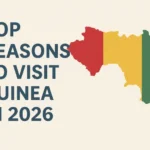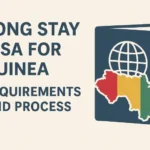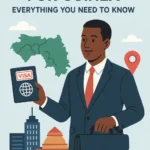Introduction
You’ve successfully obtained your visa for Guinea through VisaForGuinea.com — congratulations! Now it’s
time to prepare for your journey. Whether you’re visiting for business, tourism, or a long-term stay, knowing
what to expect on arrival will make your experience smooth and enjoyable.
This guide covers the key things you need to know once your visa is approved: entry procedures, local culture,
safety, and practical tips for traveling in Guinea.
- Entry Procedures and Arrival in Guinea
When you arrive in Guinea, usually through Conakry International Airport (CKY), have the following
documents ready for immigration:
A printed copy of your visa approval or e-visa.
Your valid passport (minimum six months validity).
Yellow fever vaccination certificate.
Proof of accommodation and return or onward ticket.
After verification, the immigration officer will stamp your passport, and you’ll be free to begin your journey.
Tip: Keep your passport and travel documents in a waterproof pouch while traveling within Guinea. - Currency and Payments
The official currency in Guinea is the Guinean Franc (GNF). Cash is widely used, but foreign visitors can
exchange USD, EUR, or CFA Francs at official exchange bureaus and banks.
Credit cards are accepted at major hotels and some businesses in Conakry.
ATMs are available but may charge international withdrawal fees.
Tip: Always carry small cash bills for taxis, markets, and rural areas where electronic payments aren’t common. - Transportation and Getting Around
Transportation in Guinea includes taxis, buses, and private cars. Conakry is the main transport hub, and from
there, you can travel inland to places like Labé, Kindia, and Nzérékoré.
For business trips, hiring a local driver or using a verified ride service is recommended for convenience and
safety.
Tip: If you’re on a short stopover, check the Transit Visa information for requirements. - Language and Communication
The official language is French, but several local languages are widely spoken, such as Fula, Susu, and
Malinké.
English is not commonly used outside business or tourism circles, so learning basic French phrases or hiring a
translator can be very helpful.
Mobile SIM cards and internet data are easily available at the airport and in most cities. - Accommodation and Hospitality
Guinea offers a variety of hotels and guesthouses, from luxury stays in Conakry to cozy lodges in rural areas.
The hospitality of Guineans is one of the highlights of any visit — locals are friendly, polite, and helpful.
Tip: For long visits, plan ahead and apply for a Long Stay Visa. - Culture and Etiquette
Guineans are warm and welcoming, but cultural respect is very important:
Always greet people politely before starting a conversation.
Dress modestly, especially in rural areas.
Ask permission before taking photos of people.
Sharing meals or drinks is considered a friendly gesture, and guests are often treated with great respect. - Safety and Health Tips
Guinea is generally safe for travelers, but like any destination, basic precautions are advised:
Avoid carrying large amounts of cash or wearing expensive jewelry.
Use registered taxis and reliable transport options.
Drink bottled or filtered water.
Have travel insurance covering medical emergencies.
Health Tip: Always keep your yellow fever vaccination card and basic medicines with you. - Exploring Guinea
Don’t miss some of Guinea’s top attractions:
Fouta Djallon – waterfalls and mountains perfect for hiking.
Conakry Grand Mosque – a stunning landmark in the capital.
Loos Islands – relaxing beach getaways just off Conakry’s coast.
Mount Nimba – a UNESCO World Heritage site full of biodiversity.
Conclusion
With your visa approved, you’re ready to experience the beauty, culture, and charm of Guinea. Whether you’re
a business traveler or tourist, this country offers a blend of authenticity and opportunity that few destinations can
match.
Start your journey confidently — and remember, VisaForGuinea.com is always available for any visa
extensions, updates, or future travel needs.

